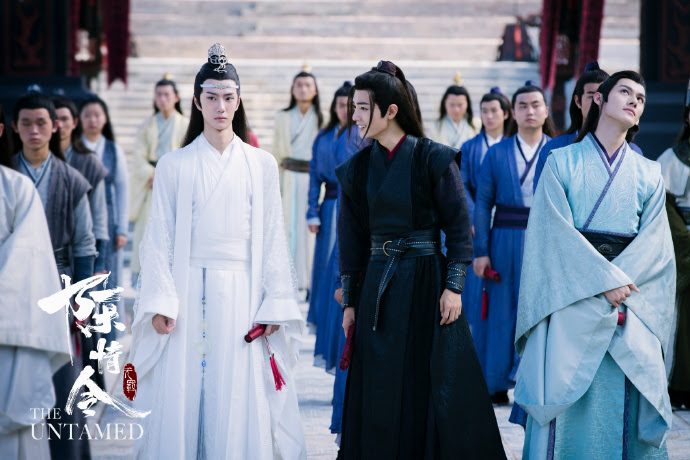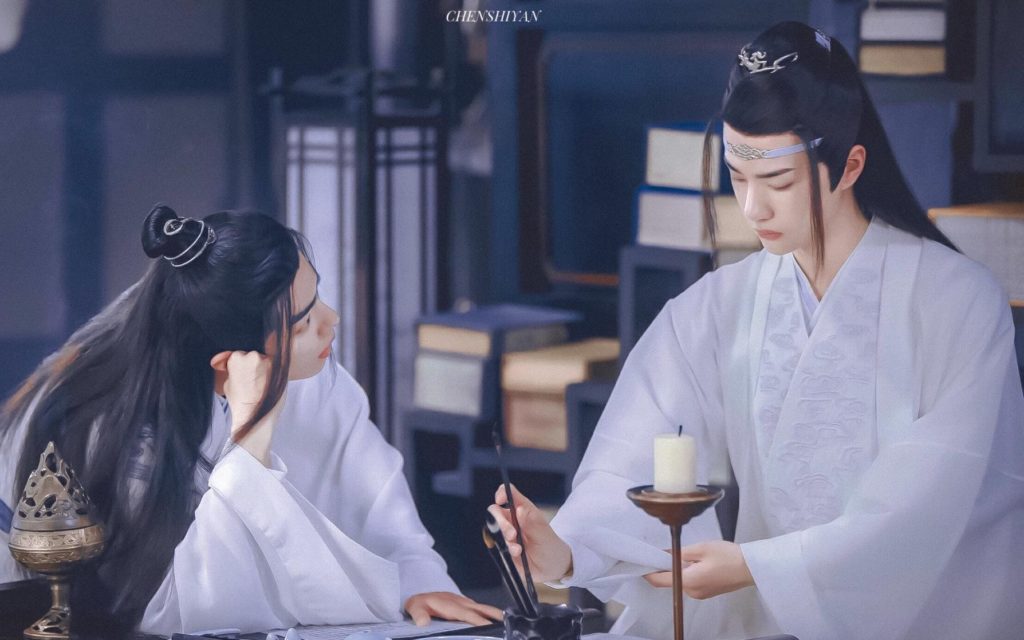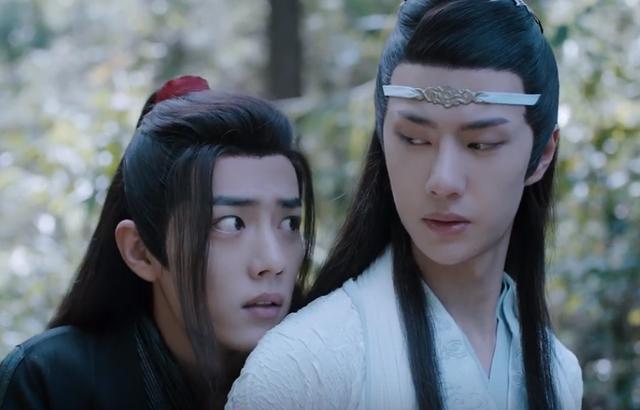陈情令 Chinese fantasy epic drama
At first it seems that not much is happening. The show strolls along for a few episodes as we get to know the characters and background. But something is different about this Chinese fantasy. The strength of the cast, the quality of the dialogue and the orchestral soundtrack make The Untamed pleasing to both eye and ear.
The Untamed draws on traditional Chinese fantasy, taking place in a mythical Taoist world. Several clans practise their own version of spiritual refinement, or cultivation. This involves learning the precepts and rules of the order to which they’ve pledged loyalty. The disciples (or 弟子, Dìzǐ) must respect authority, attend lectures and refrain from drinking too much.

Xiào Zhàn (肖战), who started in Mandopop, takes his career to the next level playing Wèi Wúxiàn (魏无羡). Wuxian is more flexible than the other disciples. His origins are mysterious, making him less receptive to traditional values. He questions authority, seeks new ways of handling old problems. And he can’t sit still in lectures.
Wuxian is attached to the Jiang clan, who are the watermark for a well-balanced sect. The next generation are rather meek and innocent. They receive instruction from elders of both the Yunmeng Jiang and the Qishan Wen.
But differences between these sects lead to conflict. Not so much differences in cultivation techniques, but personal differences. These culminate in a memorable scene when Wuxian thoughtlessly shoots down the kite of Wáng Língjiāo (王灵娇), lover of Wēn Cháo (温晁), the brash second son of the Qishan Wen patriarch.
Lingjiao confronts Yú Zǐyuān (虞紫鸢), matriarch of the Jiang. This would all be fine if it wasn’t for the fact that the confrontation takes place in the imperial hall of the Jiang. At first Ziyuan suffers Lingjiao’s insolence. But when Lingjiao takes the liberty of sitting on the Jiang throne she’s overstepped the mark. It’s now Ziyuan’s turn to be excessive in what is an unforgettable scene of humiliation. Let’s just say that Lingjiao is brought to heel!
Ziyuan’s actions earn the retaliation of the rest of the Wens until the two parties clash an unrestrained massacre of soldiers, officials and children. Abject humiliation is also in store for Wen Chao, and the Wen sect is all but wiped out. This is just the beginning. The Untamed does well to continuously evolve the story arc, with one climax birthing a new sequence of events.
Differences over treatment of prisoners of war prompt Wuxian to found his own sect. As Yiling Patriarch he has many exotic encounters, often accompanied by the surly Lán Wàngjī (蓝忘机) otherwise known as Lan Zhan, second young master of the Gusu Lan sect. Lan Zhan is played by Wáng Yībó (王一博), who also started out in the Mandopop scene.

Wuxian desires to penetrate Lan Zhan’s icy exterior, provoking him with etiquette breaches and general teasing. He drinks where alcohol is forbidden, doesn’t take lectures seriously and encourages Lan Zhan to chill out.
To its credit, The Untamed doesn’t overly tone down the bromance, paying homage to the BL in the original novel by Mo Xiang Tong Xiu (墨香铜臭). I hadn’t heard of BL before watching The Untamed. Boy’s Love, or Yaoi, is a genre of Japanese fiction and manga. The romantic attachment between Wuxian and Lan Zhan leads to some amusing bromo-erotic scenes. But they’re just buddies, right?
With their traditional long flowing hair, they do make a pretty-boy couple. For thousands of years, the men wore their hair long and the Ming dynasty style is prevalent in Chinese fantasy. The semi-shaven Qing style is less favoured. Lan Zhan wears his hair in a Ming-style bun, while Wuxian keeps his hair loose to symbolise his flouting of authority.
Speaking personally, Chinese fantasy doesn’t need to ditch the long hair, but a few short-haired characters would be good for variety. These fantasies take place outside of time and space, in their own realms, so it’s not necessary to conform to traditional modes of Chinese coiffure. In every Chinese fantasy I’ve seen, barring Monkey Magic, the men have long hair. My personal opinion: long hair adds gravity but also a certain amount of distance and pomposity.
But there’s still much to enjoy here. Solid acting, good special effects, rich scenery and costuming. I like how the visual effects styles vary from stop-motion techniques reminiscent of Ray Harryhausen to full-blown CGI-assisted battle scenes.
Wuxian dominates these battle scenes by means of his magic flute, forged from the materials of an underworld artefact known as the Stygian Tiger Amulet. Wuxian’s flute runs on bad energy and feeds on suffering. But he radically believes he can harness this negative energy in his fight for justice. Can he resist its temptations, or will he turn into an agent for the forces of darkness? Lan Zhan also has a musical weapon: a magical zither which launches shockwaves across the battlefield.

Playing the black flute not only unleashes dark forces, it also allows Wuxian to control Wēn Níng (温宁), artfully played by Yu Bin. Wen Ning is a zombie with a conscience and very good martial arts skills. He is an interesting character: introverted in life, vengeful in death. Terrifying and pitiable.
With musical weapons a major theme, it’s good The Untamed has a great score. The composer for Once Upon a Time in Lingjian mountain should pay attention. Lingjian was marred by a repetitive and intrusive soundtrack. Lin Hai’s music for The Untamed is excellent. I watched the opening sequence every time to hear the opening theme. The music never impedes the dialogue but supports and lifts it. No surprise that the soundtrack has sold over 15 million copies.
Final verdict: 8.0
The Untamed took home a slew of awards and received considerable domestic and international attention. But what was a gem of a show starts to fade. Likely the producers wanted to hit the magic 50-episode mark. Which is a pity, because it comes at the cost of The Untamed’s earlier power and brilliance.
Also, why do peasants always have dirt on their faces? If I was a peasant I’d wipe my face with a cloth now and then. And if I didn’t have a cloth I’d use my shirt. Failing that I’d use my hands. And if my hands were dirty? Repeat the above with someone else’s stuff. But that’s how wars start.
